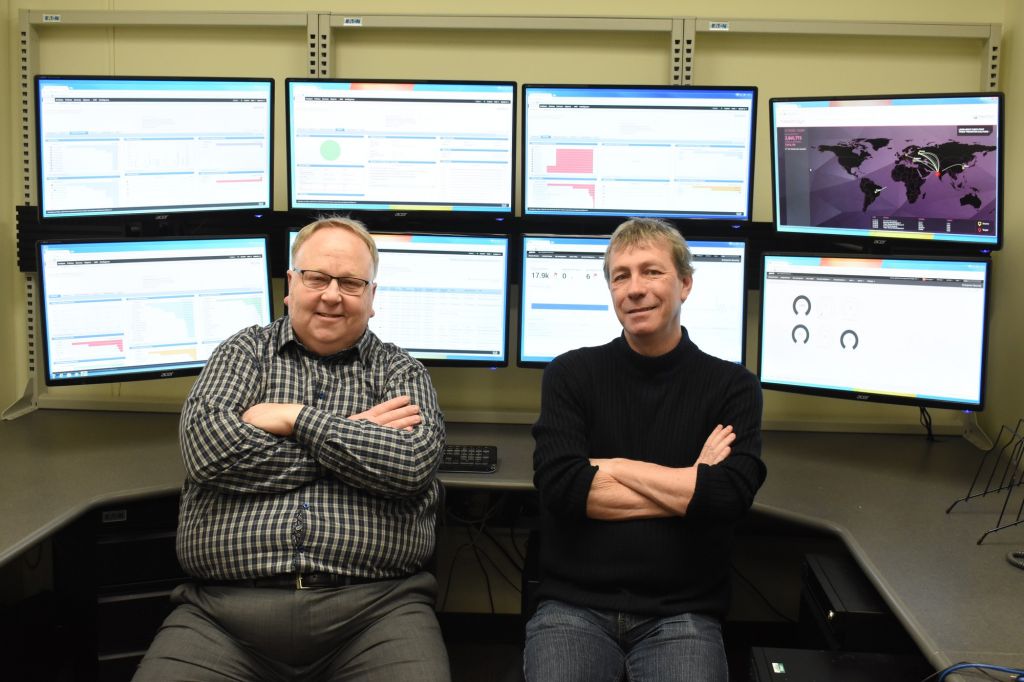While it’s not often noticed, there is a constant risk at Algonquin of being the victim of some sort of cyber attack.
As technology grows more advanced, it creates more opportunities for people who misuse it for mischief or a quick profit. As a result of the potential for hacking and other cyber attacks, Algonquin has deployed new technology to defend itself from the ever-growing threats.
It’s called “advanced malware protection” — or AMP for short.
AMP, according to Craig Delmage, the college’s chief information security officer, is more sophisticated and advanced than other antivirus systems, but what really separates it is its utilization of machine learning and artificial intelligence to recognize threats.
Most antivirus and malware programs such as Avast or Norton use signatures to detect viruses. That means they can detect viruses only after they’ve been analysed and put into a database for the antivirus program to use.
But as hackers develop new viruses and malware it takes programs time to catch up, leaving computers vulnerable to hackers with more advanced approaches.
Using machine learning and artificial intelligence, AMP can detect unusual behaviour when viruses and malware run processes on computers or alter settings that are not normally changed in certain ways. It can also detect patterns between viruses and malware, allowing it to detect and stop viruses that may be completely new.
“The fundamental thing we do is we watch for something unusual,” said senior information security technologist Colin Wass during an interview.
On top of this new system, Algonquin is also the only college in Ontario to have a security operations center. This system allows Algonquin to see what activity is performed on their servers as well as how many threats are blocked, among other info and statistics relevant to security.
But does this mean that hackers can no longer keep up with some of the largest security companies in the world?
In truth, this hidden war between hackers and security systems isn’t a fair one because hackers have far less competition between each other. While security companies have to keep their technologies largely secretive and compete against one another, hackers all work together to develop new viruses and get a leg-up on security companies as a collective whole.
This may seem like a lot of effort to put into messing with people over the internet, but the hackers’ common goal is the same as security companies’ — to make a profit. Hackers can do it in a variety of ways ranging from stealing patents to taking personal information and selling it on a hidden black market, but the end goal is always the same.
Algonquin and other colleges are at a much larger risk in particular because there are enormous treasure troves of personal information on Algonquin’s databases which are enticing for hackers. Algonquin is fighting a constant invisible war against hackers with numbers that leave the term “war” as no form of exaggeration.
“If we were to turn on a server at Algonquin and connect it to the internet we would literally be attacked within 30 seconds,” said Delmage.
The numbers back this up, as Algonquin receives millions of cyber attacks on a daily basis. The most common is theft of information as there is more to gain that way than impeding technology for Algonquin’s staff and students.
According to Delmage many students at Algonquin are infected, as some more covert viruses do harm without students even knowing.
Hackers can quietly steal personal information from computers to sell on the dark web, a hidden part of the internet filled with illegal activity that requires proxies to access, or take control of computers to launch other attacks from and keep their real location a secret. As their tools and programs become more advanced the risk is only growing.
So what can Algonquin students do about this?
According to Wass, the most important thing for people to do is research and learn about what they need to look out for.
“The last bastion of defence is humans,” said Delmage, claiming it’s not a technology problem but a risk problem. In 2018, phishing — attempting to get personal information such as credit card numbers for malicious purposes — has been the biggest problem so far when it comes to hackers. In order for everyone, including Algonquin students to stay safe, they need to know what to click and what not to.
Algonquin’s Info Security page on the Algonquin website can provide more information. Staying informed is important no matter the subject, but in this case it could be a $2,000 laptop or credit card number at risk — and all it takes is one wrong click.


